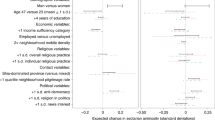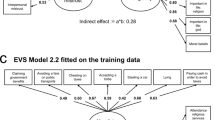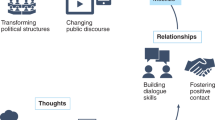Abstract
Does the experience of war increase people’s religiosity? Much evidence supports the idea that particular religious beliefs and ritual forms can galvanize social solidarity and motivate in-group cooperation, thus facilitating a wide range of cooperative behaviours including—but not limited to—peaceful resistance and collective aggression. However, little work has focused on whether violent conflict, in turn, might fuel greater religious participation. Here, we analyse survey data from 1,709 individuals in three post-conflict societies—Uganda, Sierra Leone and Tajikistan. The nature of these conflicts allows us to infer, and statistically verify, that individuals were quasirandomly afflicted with different intensities of war experience—thus potentially providing a natural experiment. We then show that those with greater exposure to these wars were more likely to participate in Christian or Muslim religious groups and rituals, even several years after the conflict. The results are robust to a wide range of control variables and statistical checks and hold even when we compare only individuals from the same communities, ethnic groups and religions.
This is a preview of subscription content, access via your institution
Access options
Access Nature and 54 other Nature Portfolio journals
Get Nature+, our best-value online-access subscription
$29.99 / 30 days
cancel any time
Subscribe to this journal
Receive 12 digital issues and online access to articles
$119.00 per year
only $9.92 per issue
Buy this article
- Purchase on Springer Link
- Instant access to full article PDF
Prices may be subject to local taxes which are calculated during checkout

Similar content being viewed by others
Code availability
All code files for a complete reproduction of the analyses herein are available at: https://github.com/bgpurzycki/Religion-and-Violence.
Data availability
All data and analytical scripts are available at: https://github.com/bgpurzycki/Religion-and-Violence.
References
Purzycki, B. G. & Gibson, K. Religion and violence. Skeptic 16, 22–27 (2011).
Atran, S. The devoted actor: unconditional commitment and intractable conflict across cultures. Curr. Anthropol. 57, S192–S203 (2016).
Norenzayan, A. et al. The cultural evolution of prosocial religions. Behav. Brain Sci. https://dx.doi.org/10.1017/S0140525X14001356 (2016).
Purzycki, B. G. The minds of gods: a comparative study of supernatural agency. Cognition 129, 163–179 (2013).
Ruffle, B. J. & Sosis, R. Does it pay to pray? Costly ritual and cooperation. B. E. J. Econom. Anal. Policy https://doi.org/10.2202/1935-1682.1629 (2007).
Atran, S. Genesis of suicide terrorism. Science 299, 1534–1539 (2003).
Ruffle, B. J. & Sosis, R. Cooperation and the in-group-out-group bias: a field test on Israeli kibbutz members and city residents. J. Econ. Behav. Organ. 60, 147–163 (2006).
Sosis, R., Kress, H. & Boster, J. Scars for war: evaluating signaling explanations for cross-cultural variance in ritual costs. Evol. Hum. Behav. 28, 234–247 (2007).
Sheikh, H., Ginges, J., Coman, A. & Atran, S. Religion, group threat and sacred values. Judgm. Decis. Mak. 7, 110–118 (2012).
McKay, R., Efferson, C., Whitehouse, H. & Fehr, E. Wrath of God: religious primes and punishment. Proc. Biol. Sci. 278, 1858 (2011).
McCullough, M. E. & Willoughby, B. L. B. Religion, self-regulation, and self-control: associations, explanations, and implications. Psychol. Bull. 135, 69–93 (2009).
Blogowska, J., Lambert, C. & Saroglou, V. Religious prosociality and aggression: it’s real. J. Sci. Study Relig. 52, 524–536 (2013).
McKay, R. & Whitehouse, H. Religion and morality. Psychol. Bull. 141, 447–473 (2015).
Bushman, B. J., Ridge, R. D., Das, E., Key, C. W. & Busath, G. L. When God sanctions killing—effect of scriptural violence on aggression. Psychol. Sci. 18, 204–207 (2007).
Clingingsmith, D., Khwaja, A. I. & Kremer, M. Estimating the impact of the Hajj: religion and tolerance in Islam’s global gathering. Q. J. Econ. 124, 1133–1170 (2009).
Rothschild, Z. K., Abdollahi, A. & Pyszczynski, T. Does peace have a prayer? The effect of mortality salience, compassionate values, and religious fundamentalism on hostility toward out-groups. J. Exp. Soc. Psychol. 45, 816–827 (2009).
Shen, M. J., Yelderman, L. A., Haggard, M. C. & Rowatt, W. C. Disentangling the belief in God and cognitive rigidity/flexibility components of religiosity to predict racial and value-violating prejudice: a post-critical belief scale analysis. Pers. Individ. Differ. 54, 389–395 (2013).
Wansink, B. & Wansink, C. S. Are there atheists in foxholes? Combat intensity and religious behavior. J. Rel. Health 52, 768–779 (2013).
Boyd, R. & Richerson, P. J. The Origin and Evolution of Cultures (Oxford Univ. Press, Oxford, 2005).
Boyd, R. & Richerson, P. J. Culture and the Evolutionary Process (Univ. of Chicago Press, Chicago, 1985).
Henrich, J. & Boyd, R. Why people punish defectors: weak conformist transmission can stabilize costly enforcement of norms in cooperative dilemmas. J. Theor. Biol. 208, 79–89 (2001).
Roos, P., Gelfand, M., Nau, D. & Lun, J. Societal threat and cultural variation in the strength of social norms: an evolutionary basis. Organ. Behav. Hum. Decis. Process. 129, 14–23 (2015).
Henrich, J. The Secret of our Success: How Culture is Driving Human Evolution, Domesticating our Species, and Making us Smart (Princeton Univ. Press, Princeton, 2016).
Whitehouse, H., McQuinn, B., Buhrmester, M. & Swann, W. B. Brothers in arms: Libyan revolutionaries bond like family. Proc. Natl Acad. Sci. USA 111, 17783–17785 (2014).
Gelfand, M. J. et al. Differences between tight and loose cultures: a 33-nation study. Science 332, 1100–1104 (2011).
Harrington, J. R. & Gelfand, M. J. Tightness–looseness across the 50 united states. Proc. Natl Acad. Sci. USA 111, 7990–7995 (2014).
Bornstein, G. & Benyossef, M. Cooperation in intergroup and single-group social dilemmas. J. Exp. Soc. Psychol. 30, 52–67 (1994).
Bornstein, G. & Erev, I. The enhancing effect of intergroup competition on group-performance. Int. J. Confl. Manage. 5, 271–283 (1994).
Puurtinen, M. & Mappes, T. Between-group competition and human cooperation. Proc. Biol. Sci. 276, 355–360 (2009).
Saaksvuori, L., Mappes, T. & Puurtinen, M. Costly punishment prevails in intergroup conflict. Proc. Biol. Sci. 278, 3428–3436 (2011).
Francois, P., Fujiwara, T. & van Ypersele, T. The origins of human pro-sociality: cultural group selection in the workplace and the laboratory. Sci. Adv. 4, eaat2201 (2018).
Grant, F. & Hogg, M. A. Self-uncertainty, social identity prominence and group identification. J. Exp. Soc. Psychol. 48, 538–542 (2012).
Hogg, M. A. & Adelman, J. Uncertainty–identity theory: extreme groups, radical behavior, and authoritarian leadership. J. Soc. Issues 69, 436–454 (2013).
Smith, J. R., Hogg, M. A., Martin, R. & Terry, D. J. Uncertainty and the influence of group norms in the attitude–behaviour relationship. Br. J. Soc. Psychol. 46, 769–792 (2007).
Bauer, M. et al. Can war foster cooperation? J. Econ. Perspect. 30, 249–274 (2016).
Bauer, M., Cassar, A., Chytilova, J. & Henrich, J. War’s enduring effects on the development of egalitarian motivations and in-group biases. Psychol. Sci. 25, 47–57 (2014).
Voors, M. J. et al. Violent conflict and behavior: a field experiment in Burundi. Am. Econ. Rev. 102, 941–964 (2012).
House, B. R. et al. Ontogeny of prosocial behavior across diverse societies. Proc. Natl Acad. Sci. USA 110, 14586–14591 (2013).
Barber, B. K. Contrasting portraits of war: youths’ varied experiences with political violence in Bosnia and Palestine. Int. J. Behav. Dev. 32, 298–309 (2008).
Sosis, R. & Handwerker, W. P. Psalms and coping with uncertainty: religious Israeli women’s responses to the 2006 Lebanon war. Am. Anthropol. 113, 40–55 (2011).
Lang, M., Krátký, J., Shaver, J.H., Jerotijević, D. & Xygalatas, D. Effects of anxiety on spontaneous ritualized behavior. Curr. Biol. 25, 1892-1897.
Boyer, P. & Lienard, P. Precaution systems and ritualized behavior. Behav. Brain Sci. 29, 635–650 (2006).
Pargament, K., Harold, B. W. S., Koenig, G. & Perez, L. Patterns of positive and negative religious coping with major life stressors. J. Sci. Study Relig. 37, 710–724 (1998).
McNamara, R. A., Norenzayan, A. & Henrich, J. Supernatural punishment, in-group biases, and material insecurity: experiments and ethnography from Yasawa, Fiji. Religion Brain Behav. 6, 34–55 (2016).
Purzycki, B. G. et al. Moralistic gods, supernatural punishment and the expansion of human sociality. Nature 530, 327–330 (2016).
Greenberg, J., Pyszczynski, T. & Solomon, S. in Public Self and Private Self (ed Baumeister R. F.) 189–212 (Springer, Berlin, 1986).
Norris, P. & Inglehart, R. Sacred and Secular: Religion and Politics Worldwide 2nd edn (Cambridge Univ. Press, Cambridge, 2012).
Stark, R. The Rise of Christianity: How the Obscure, Marginal Jesus Movement became the Dominant Religious Force in the Western World in a Few Centuries (Harper Collins, New York, 1997).
Gneezy, A. & Fessler, D. M. T. Conflict, sticks and carrots: war increases prosocial punishments and rewards. Proc. Biol. Sci. 279, 219–223 (2011).
Allen, T. & Vlassenroot, K. The Lord’s Resistance Army: Myth and Reality (Zed Books, London, 2010).
Bellows, J. & Miguel, E. War and local collective action in Sierra Leone. J. Public Econ. 93, 1144–1157 (2009).
HRW World Report 1999. Sierra Leone: Defending Human Rights. Human Rights Watch https://www.hrw.org/legacy/worldreport99/africa/sierraleone.html (1999).
Cassar, A., Grosjean, P. & Whitt, S. Legacies of violence: trust and market development. J. Econ. Growth 18, 285–318 (2013).
Bauer, M., Fiala, N. & Levely, I. V. Trusting former rebels: an experimental approach to understanding reintegration after civil war. Econ. J. 128, 1786–1819 (2018).
Altonji, J. G., Elder, T. E. & Taber, C. R. Selection on observed and unobserved variables: assessing the effectiveness of Catholic schools. J. Polit. Econ. 113, 151–184 (2005).
Turchin, P. Ultra Society: How 10,000 Years of War Made Humans the Greatest Cooperators on Earth (Beresta Books, Chaplin, CT, USA, 2015).
Willard, A. K., Henrich, J. & Norenzayan, A. Memory and belief in the transmission of counterintuitive content. Hum. Nat. 27, 221–243 (2016).
Lanman, J. A. The importance of religious displays for belief acquisition and secularization. J. Contemp. Religion 27, 49–65 (2012).
Willard, A. K. & Cingl, L. Testing theories of secularization and religious belief in the Czech Republic and Slovakia. Evol. Hum. Behav. 38, 604–615 (2017).
Lanman, J. A. & Buhrmester, M. D. Religious actions speak louder than words: exposure to credibility-enhancing displays predicts theism. Religion Brain Behav. 7, 3–16 (2017).
McCleary, R. M. & Barro, R. J. Religion and economy. J. Econ. Perspect. 20, 49–72 (2006).
Atran, S. & Henrich, J. The evolution of religion: how cognitive by-products, adaptive learning heuristics, ritual displays, and group competition generate deep commitments to prosocial religions. Biol. Theory 5, 18–30 (2010).
Henrich, J. The evolution of costly displays, cooperation and religion: credibility enhancing displays and their implications for cultural evolution. Evol. Hum. Behav. 30, 244–260 (2009).
Cassar, A., Grosjean, P. & Whitt, S. in The economics of Conflict: Theory and Empirical Evidence (ed Warneryd K.) (MIT Press, Cambridge, MA, USA, 2013).
Rohner, D., Thoenig, M. & Zilibotti, F. Seeds of distrust: conflict in Uganda. J. Econ. Growth 18, 217–252 (2013).
Ginges, J., Hansen, I. & Norenzayan, A. Religious and popular support for suicide attacks. Psychol. Sci. 20, 224–230 (2009).
Burger, J. M. & Lynn, A. L. Superstitious behavior among American and Japanese professional baseball players. Basic Appl. Soc. Psych. 27, 71–76 (2005).
Rudski, J. Competition, superstition and the illusion of control. Curr. Psychol. 20, 68–84 (2001).
Joukhador, J., Blaszczynski, A. & Maccallum, F. Superstitious beliefs in gambling among problem and non-problem gamblers: preliminary data. J. Gambl. Stud. 20, 171–180 (2004).
Bleak, J. L. & Frederick, C. M. Supersititious behavior in sport: levels of effectiveness and determinants of use in three collegiate sports. J. Sport Behav. 2, 1–15 (1998).
Legare, C. H. & Souza, A. L. Evaluating ritual efficacy: evidence from the supernatural. Cognition 124, 1–15 (2012).
Legare, C. H. & Souza, A. L. Searching for control: priming randomness increases the evaluation of ritual efficacy. Cogn. Sci. 38, 152–161 (2014).
Vail, K. E. et al. A terror management analysis of the psychological functions of religion. Pers. Soc. Psychol. Rev. 14, 84–94 (2010).
Jonas, E. & Fischer, P. Terror management and religion: evidence that intrinsic religiousness mitigates worldview defense following mortality salience. J. Pers. Soc. Psychol. 91, 553–567 (2006).
Pyszczynski, T., Sheldon, S. & Greenberg, J. In the Wake of 9/11: the Psychology of Terror (American Psychological Association, Washington DC, 2003).
Norenzayan, A., Atran, S., Faulkner, J. & Schaller, M. Memory and mystery: the cultural selection of minimally counterintuitive narratives. Cogn. Sci. 30, 531–553 (2006).
Mikulincer, M. & Florian, V. Exploring individual differences in reactions to mortality salience: does attachment style regulate terror management mechanisms?. J. Pers. Soc. Psychol. 79, 260–273 (2000).
Blattman, C. From violence to voting: war and political participation in Uganda. Am. Political Sci. Rev. 103, 231–247 (2009).
Atran, S., Sheikh, H. & Gomez, A. Devoted actors sacrifice for close comrades and sacred cause. Proc. Natl Acad. Sci. USA 111, 17702–17703 (2014).
Atran, S. Combating Al Qaeda’s splinters: mishandling suicide terrorism. Wash. Q. 27, 67–90 (2004).
Pape, R. A. The strategic logic of suicide terrorism. Am. Polit. Sci. Rev. 97, 343–361 (2003).
Dawkins, R. The God Delusion (Houghton Mifflin, Boston, 2006).
Harris, S. The End of Faith: Religion, Terror, and the Future of Reason (W. W. Norton, New York, 2005).
Hitchens, C. God is Not Great: How Religion Poisons Everything (Twelve, New York, 2007).
Acknowledgements
B.P. was supported by the Cultural Evolution of Religion Research Consortium which is funded by SSHRC and the John Templeton Foundation during the initial preparation of this manuscript. J.H. thanks CIFAR. M.B. and J.C. thank the Czech Science Foundation. A.C. acknowledges a grant from Title VIII/Department of State, Bureau of Intelligence and Research for fieldwork in Tajikistan and funding from the University of San Francisco for fieldwork in Sierra Leone. The funders had no role in the study design, data collection and analysis, decision to publish or preparation of the manuscript.
Author information
Authors and Affiliations
Contributions
M.B., J.C. and J.H. conceived the study and initiated manuscript preparation. M.B., A.C. and J.C. collected data (M.B. acknowledges N. Fiala and I. Levely as collaborators in the Ugandan project, A.C. acknowledges P. Grosjean and S. Whitt as collaborators in the Tajik project). M.B., J.C. and B.P. conducted analysis. M.B., A.C., J.C., J.H. and B.P. contributed to preparation of the manuscript, J.H. and B.P. had a lead role.
Corresponding author
Ethics declarations
Competing interests
The authors declare no competing interests.
Additional information
Publisher’s note: Springer Nature remains neutral with regard to jurisdictional claims in published maps and institutional affiliations.
Supplementary information
Supplementary Information
Supplementary Methods, Supplementary Discussion, and Supplementary Tables 1–19.
Rights and permissions
About this article
Cite this article
Henrich, J., Bauer, M., Cassar, A. et al. War increases religiosity. Nat Hum Behav 3, 129–135 (2019). https://doi.org/10.1038/s41562-018-0512-3
Received:
Accepted:
Published:
Issue Date:
DOI: https://doi.org/10.1038/s41562-018-0512-3
This article is cited by
-
Evidence from 43 countries that disease leaves cultures unchanged in the short-term
Scientific Reports (2024)
-
COVID-19 and the Sikh Community in the UK: A Qualitative Study
Journal of Religion and Health (2022)
-
The dual evolutionary foundations of political ideology
Nature Human Behaviour (2020)
-
COVID-19, Mental Health, and Religious Coping Among American Orthodox Jews
Journal of Religion and Health (2020)
-
Self in the Supernatural Belief Context: A Conceptual Analysis
Psychological Studies (2019)



